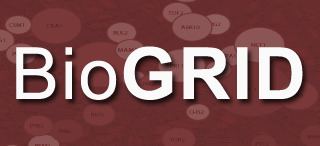Organisms All | ||
 | ||
Description BioGRID is an online biological interaction repository with data compiled through comprehensive curation efforts. Data typescaptured Protein Interactions, Genetic Interactions, Chemical Interactions, Post-Translational Modifications. Research center Université de Montréal, Princeton University, Mount Sinai Hospital, University of Edinburgh Laboratory Institut de Recherche en Immunologie et en Cancérologie, Lewis-Sigler Institute for Integrative Genomics, Lunenfeld-Tanenbaum Research Institute, Wellcome Trust Center for Cell Biology Authors | ||
The Biological General Repository for Interaction Datasets (BioGRID) is a curated biological database of protein-protein interactions, genetic interactions, chemical interactions, and post-translational modifications created in 2003 (originally referred to as simply the General Repository for Interaction Datasets (GRID) by Mike Tyers, Bobby-Joe Breitkreutz, and Chris Stark at the Lunenfeld-Tanenbaum Research Institute at Mount Sinai Hospital. It strives to provide a comprehensive curated resource for all major model organism species while attempting to remove redundancy to create a single mapping of data. Users of The BioGRID can search for their protein or publication of interest and retrieve annotation, as well as curated data as reported, by the primary literature and compiled by in house large-scale curation efforts. The BioGRID is hosted in Toronto, Ontario, Canada and Dallas, Texas, United States and is partnered with the Saccharomyces Genome Database. The BioGRID is funded by the BBSRC, NIH, and CIHR. BioGRID is a member of the International Molecular Exchange Consortium (IMEx).
Contents
History
The BioGRID was originally published and released as simply the General Repository for Interaction Datasets but was later renamed to the BioGRID in order to more concisely describe the project, and help distinguish it from several GRID Computing projects with a similar name. Originally separated into organism specific databases, the newest version now provides a unified front end allowing for searches across several organisms simultaneously. The BioGRID was developed initially as a project at the Lunenfeld-Tanenbaum Research Institute at Mount Sinai Hospital but has since expanded to include teams at the Institut de Recherche en Immunologie et en Cancérologie at the Université de Montréal, the Lewis-Sigler Institute for Integrative Genomics at Princeton University, and the Wellcome Trust Center for Cell Biology at the University of Edinburgh. The BioGRID's original focus was on curation of binary protein-protein and genetic interactions, but has expanded over several updates to incorporate curated post-translational modification data, chemical interaction data, and complex multi-gene/protein interactions. Moreover, on a monthly basis, the BioGRID continues to expand curated data and also develop and release new tools, data from comprehensive targeted curation projects, and perform targeted scientific analysis.
Abstract
The Biological General Repository for Interaction Datasets (BioGRID) is an open access database that houses genetic and protein interactions curated from the primary biomedical literature for all major model organism species and humans. As of 1 September 2014, the BioGRID contains 749,912 interactions as drawn from 43,149 publications that represent 30 model organisms. BioGRID data are freely distributed through partner model organism databases and meta-databases and are directly downloadable in a variety of formats. In addition to general curation of the published literature for the major model species, BioGRID undertakes themed curation projects in areas of particular relevance for biomedical sciences, such as the ubiquitin-proteasome system and various human disease-associated interaction networks. BioGRID curation is coordinated through an Interaction Management System (IMS) that facilitates the compilation interaction records through structured evidence codes, phenotype ontologies, and gene annotation. The BioGRID architecture has been improved in order to support a broader range of interaction and post-translational modification types, to allow the representation of more complex multi-gene/protein interactions, to account for cellular phenotypes through structured ontologies, to expedite curation through semi-automated text-mining approaches, and to enhance curation quality control. Through comprehensive curation efforts, BioGRID now includes a virtually complete set of interactions reported to date in the primary literature for budding yeast (Saccharomyces cerevisiae), thale cress (Arabidopsis thaliana), and fission yeast (Schizosaccharomyces pombe).
Supported Organisms
The following organisms are currently supported within the BioGRID, and each has curated interaction data available according to the latest statistics.
Funding for BioGRID
BioGRID is funded by grants from the National Institutes of Health, Canadian Institutes of Health Research, and the Biotechnology and Biological Sciences Research Council.
